Risque
Le rapport « La situation mondiale des transferts monétaires » du CaLP Network indique que l’idée selon laquelle les transferts monétaires seraient plus risqués que d’autres formes d’aide est l’une des barrières principales à l’utilisation fréquente de cette modalité. Ces craintes sont liées à l’insistance de plus en plus franche des bailleurs concernant la lutte contre le terrorisme et contre le blanchiment d’argent, et à l’amenuisement des budgets destinés à l’assistance humanitaire. Le travail du CALP Network sur cette problématique vise à combattre les idées reçues, à faciliter la collaboration et à partager les apprentissages afin de veiller à ce que les transferts monétaires soient systématiquement considérés, tout comme d’autres modalités, en fonction des données probantes disponibles sur les risques réels de toutes les modalités.
Priorités actuelles
Plusieurs organisations travaillent actuellement sur les risques entraînés par les transferts monétaires. Le CALP Network cherche à identifier les synergies entre acteurs, à éviter les duplications et à définir des priorités communes sur lesquelles nous pourrions agir plus efficacement en groupe. Avec le PAM, le CALP Network co-dirige l’élément Risques, priorité du chantier du Grand Bargain sur les transferts monétaires.
Contenu présenté

Podcast: Will risk aversion hold us back from realizing the potential of CVA?
Podcast
Episode 1 of the CashCast, exploring how attitudes to risk have impacted the use of CVA in the Middle East and North Africa region.

Transferts monétaires et risques : ce qui se passe sur le terrain, reste sur le terrain (et pourquoi c’est un problème)
Blog Post
En octobre 2019, le CALP Network a facilité à Douala, au Cameroun, une réunion de partage d’expériences sur les risques liés à la protection des bénéficiaires dans les interventions monétaires. Cette réunion restreinte, organisée dans le cadre d’une série de rencontres dans différentes régions, a permis à 25 travailleurs humanitaires d’Afrique de l’Ouest et du Centre,...

Webinar: Data sharing in CVA: ethics, ownership and privacy
Event
Thematic lead
Contenu récent

Social Protection as a Pathway to Sustaining Peace
Policy paper
Global crises are becoming the new normal. From climate change to the contemporary food price crisis, vulnerable populations – and especially rural people – are facing increasingly difficult odds of flourishing. Such challenges are even more pronounced where there is conflict, whose multidimensional...

Guidelines on policies and controls for the effective management of money laundering and terrorist financing (ML/TF) risks when providing access to financial services
Guidelines and Tools
Guidance for financial institutions on how to manage money laundering and terrorist financing risks (ML/TF) whilst not excluding vulnerable populations.

Comment atténuer les risques de violence basée sur le genre (VBG) dans les transferts monétaires (TM)
Video
Les transferts monétaires (TM) sont un outil important pour aider les personnes touchées par une crise à se remettre sur pied. Mais comme toute autre forme d’assistance, il est essentiel de veiller à ce qu’elle n’alimente pas les tensions au sein du foyer ou de la communauté et qu’elle ne...
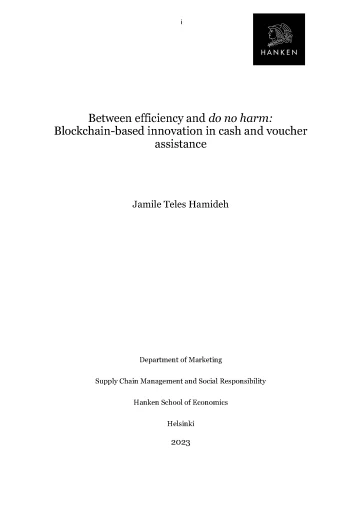
Between efficiency and do no harm: Blockchain-based innovation in cash and voucher assistance
Report
The focus of this study is the determination of the risk factors for beneficiaries that arise from the use of blockchain technology in the delivery of cash and voucher assistance (CVA), as part of a framework for the identification of digital harm. The study also aims to use the said framework to create...

Les changements apportés aux sanctions économiques des États-Unis et de l’ONU pourraient simplifier la mise en œuvre des transferts monétaires
Blog Post
Les récents changements apportés aux régimes de sanctions économiques de l’ONU et des États-Unis promettent d’améliorer le processus de transferts monétaires à travers les frontières internationales, mais les changements pourraient ne pas être aussi rapides ou complets que nous...
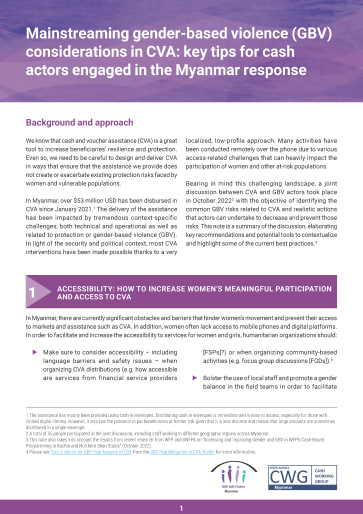
Mainstreaming Gender-based Violence (GBV) Considerations in CVA: Key tips for Cash Actors Engaged in the Myanmar Response
Case Study
In Myanmar, over $53 million USD has been disbursed in CVA since January 2021. The delivery of the assistance has been impacted by tremendous context-specific challenges, both technical and operational as well as related to protection or gender-based violence (GBV). In light of the security and political...
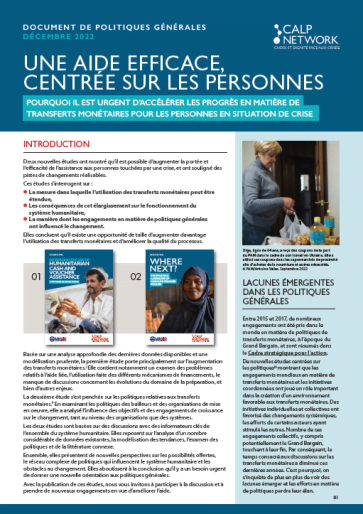
Une aide efficace, centrée sur les personnes : pourquoi il est urgent d’accélérer les progrès en matière de transferts monétaires pour les personnes en situation de crise
Guides et outils
Ce document de politiques générales, qui présente des arguments clairs en faveur de l'action, expose les dernières données probantes et informations sur la manière dont les transferts monétaires sont utilisés, et indique s'ils atteignent leur potentiel en matière de soutien aux personnes en...
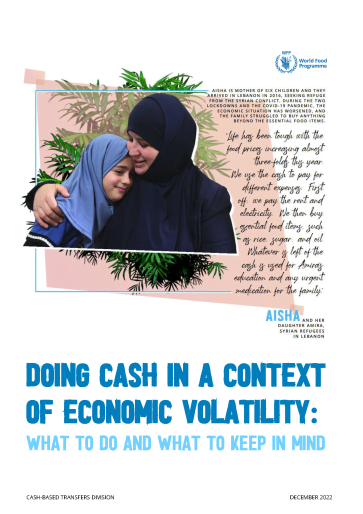
Doing Cash in a context of economic volatility: What to do and what to keep in mind
Guidelines and Tools
This interim WFP guidance was issued in 2022 to provide support to cash operations in contexts of economic volatility, be it when there is inflation, depreciation or currency volatility, parallel exchange rates, liquidity issues and changes in financial regulation, among others.

Operational research on GBV risk mitigation in relation to CVA in humanitarian settings – UNFPA/GWI collaborative research
Case Study
The Global Women’s Institute at George Washington University and UNFPA have launched a collaboration to examine GBV risk mitigation in relation to CVA in humanitarian settings in order to: (a) further corroborate the presence of GBV risks to women and girls in current CVA programming; and b) develop...
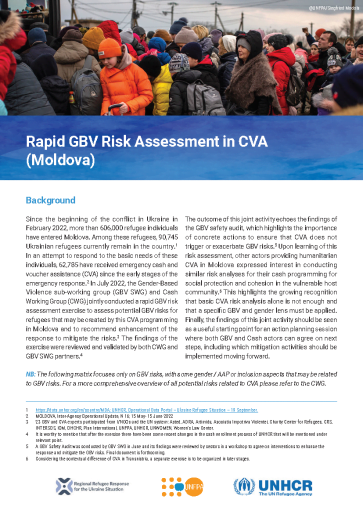
Moldova: Rapid GBV Risk Assessment in CVA
Case Study
Since the beginning of the conflict in Ukraine in February 2022, more than 606,000 refugee individuals have entered Moldova. Among these refugees, 90,745 Ukrainian refugees currently remain in the country. In an attempt to respond to the basic needs of these individuals, 62,785 have received emergency...

From Risk to Choice: Cash within GBV Case Management in Jordan
Case Study
In 2021, the United Nations Population Fund (UNFPA) in Jordan piloted the integration of cash assistance within gender-based violence (GBV) programming. The pilot targeted GBV survivors and women at risk of GBV – including Jordanians, Syrian refugees and refugees of other nationalities – within the...
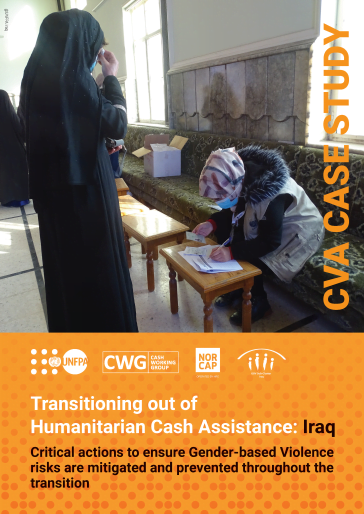
Transitioning out of Humanitarian Cash Assistance in Iraq: Critical Actions to Ensure Gender-based Violence Risks are Mitigated and Prevented throughout the Transition
Case Study
In light of ongoing efforts to transition away from humanitarian Cash assistance in Iraq, a two-day workshop took place in Erbil on June 22 which gathered more than 32 gender-based violence (GBV) and cash and voucher assistance (CVA) actors with the goal of identifying priorities for the transition period...

Briefing Note on Panel Discussion between DCF and Partners on Exchange Rates and Cash Assistance
Meeting minutes
This briefing note summarises the key points from a discussion held between the Donor Cash Forum (DCF) and partners on 4th April 2022. The rationale for this session is the increasing number of humanitarian contexts experiencing inflation and/or depreciation, with significant impacts on humanitarian...
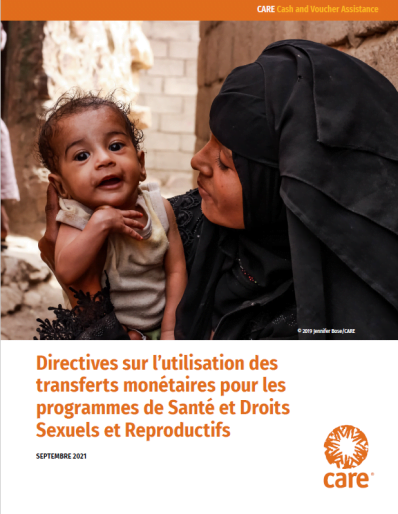
Directives sur l’utilisation des transferts monétaires pour les programmes de Santé et Droits Sexuels et Reproductifs
Guides et outils
En 2020, CARE a effectué une étude multi-pays de projets ayant recours aux transferts monétaires pour la SSR. Cette étude a fourni des résultats provenant de quatre type d’utilisations des transferts monétaires pour des résultats en matière de SSR dans des contextes humanitaires. Elle contribue...
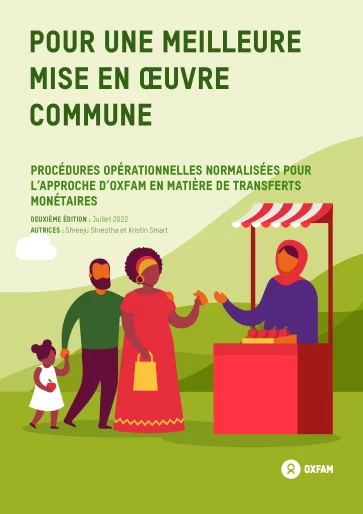
Pour une meilleure mise en œuvre commune : Procédures opérationnelles normalisées pour l’approche d’Oxfam en matière de transferts monétaires
Guides et outils
Pour une meilleure mise en œuvre commune: Procédures opérationnelles normalisées pour l’approche d’oxfam en matière de transferts monétaires est un guide numérique sur tout ce qui concerne les transferts monétaires à Oxfam. Il peut être téléchargé et consulté sur un téléphone, une...
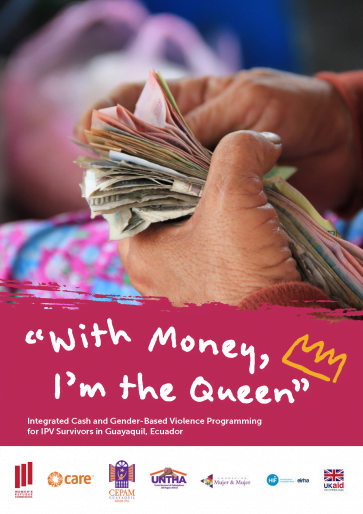
Integrated Cash and Gender-Based Violence Programming for IPV Survivors in Guayaquil, Ecuador
Case Study
Migrant and refugee women and girls are vulnerable to a range of risks before, during, and after humanitarian crises. Intimate partner violence (IPV) is a type of gender-based violence (GBV) and is among the many protection-specific risks they face. As a result of the conflict in Venezuela, an estimated...

Digital Feast and Famine: Digital Technologies and Humanitarian Law in Food Security, Starvation and Famine Risk
Report
This working paper presents the findings of a brief exploratory study into the role of digital technologies in International Humanitarian Law (IHL) and its implications for starvation and famine risk. It is a work in progress, intended to raise issues rather than reach definitive conclusions (given the...
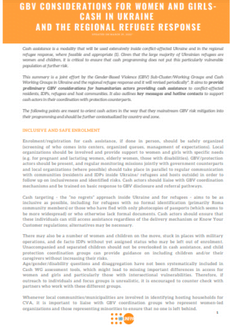
GBV Considerations for Women and Girls- Cash in Ukraine and the Regional Refugee Response- UNFPA 2022
Guidelines and Tools
Cash assistance is a modality that will be used extensively inside conflict-affected Ukraine and in the regional refugee response, where feasible and appropriate (1). Given that the large majority of Ukrainian refugees are women and children, it is critical to ensure that cash programming does not put...
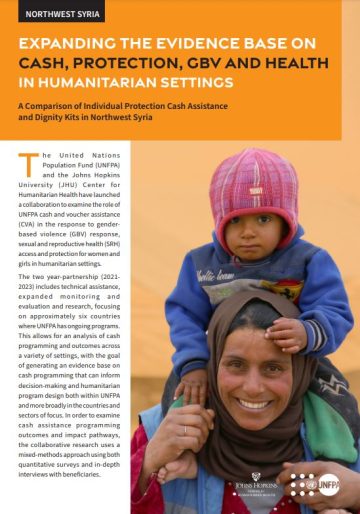
Expanding the Evidence Base on Cash, Protection, GBV and Health in Humanitarian Settings Findings from Northwest Syria: A Comparison of Individual Protection Assistance and Dignity Kits
Case Study
As part of 2021 programming in northwest Syria, UNFPA and its implementing partners provided dignity kits (hygiene and sanitary products) and individual protection assistance (IPA, a one-off unconditional cash transfer) to those in need. The two interventions were intended to provide immediate assistance...
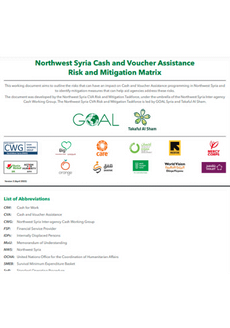
Northwest Syria Cash and Voucher Assistance Risk and Mitigation Matrix
Guidelines and Tools
This risk matrix is a working document which outlines the key risks that can have an impact on Cash and Voucher Assistance programming in Northwest Syria and identifies mitigation measures that can help aid agencies address these risks. These CVA risks and mitigation measures were identified through an...



